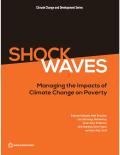Costa Rica is regarded by many as an economic and environmental success story, with an admirable record of ‘green growth’—economic growth that minimizes pollution and uses and manages resources efficiently. Yet Costa Rica is also a victim of its own success: its leadership in some areas may have blinded it to its green growth gaps. As Costa Rica approaches a crossroads in its economic and environmental journey, its choices could provide the model for others to follow.
This report looks at concrete results of green growth in Costa Rica, rather than listing policies and projects. It examines the root causes of under-performance, the synergies between the country’s economy and environment and prospects for future progress in both domains. Finally it highlights the deep structural challenges to the organisation of Costa’s Rica’s economy, and it suggests some ‘quick wins’ that will propel Costa Rica towards long-term approaches to better align its economic and environmental performance.
This report is also available in Spanish, which can be downloaded here.
This case study reflects on a WWF Green Economy Modelling report conducted in 2013 ‘Green Economy Modelling of Ecosystem Services in the Dawna Tenasserim Landscape (DTL) along the ‘Road to Dawei’, which looked specifically at the sustainable transport infrastructure options within this landscape which straddles both Thailand and Myanmar. The case study provides a summary of the analysis and results from the report, including the projections generated up to 2035 that analyze the short, medium and longer-term consequences of road construction and from these, how a green economy approach over a business as usual approach is not only the most sustainable choice, but also the more economical choice in the long term, that helps healthy economies and societies to grow.

Climate change and climate policies will affect poverty reduction efforts through direct and immediate impacts on the poor and by affecting factors that condition poverty reduction, such as economic growth. This report explores the relation between climate change, climate policies, and poverty outcomes by examining three questions: the (static) impact on poor people's livelihood and well-being; the impact on the risk for non-poor individuals to fall into poverty; and the impact on the ability of poor people to escape poverty. The report explores various channels through which climate change and policies will affect poverty: economic impacts through incomes and prices; natural disasters and their effects on assets and livelihoods; and health impacts. It also investigates policy options to ensure adaptation and mitigation policies -- such as adaptive and well-targeted social protection, public investments, and financial inclusion policies -- contribute to poverty reduction and protect poor people against climate change impacts.
While South Africa is the second largest economy in Africa and has a relatively high GDP per capita, poverty, (youth) unemployment, inequality, food insecurity and environmental degradation are some of the greatest challenges faced by the country. Evidence shows that social and environmental enterprises that apply green and inclusive business models can play a significant role in addressing those challenges on the ground, and in turn, in achieving sustainable development. The National Sustainable Development Strategy highlighted the role of SMMEs, the informal sector and gender in a green economy in development. It is essential for policy makers to understand the impact of those enterprises and how their scale-up can be promoted through policy interventions. This report provides case studies in South Africa and highlights the social, economic and environmental impacts (Triple Bottom Line impacts) delivered by these enterprises, namely:
This study assesses the potential contribution of public– private partnerships to Inclusive Green Growth, which is one of the main goals of Dutch development cooperation. Inclusive Green Growth – or ‘the economics of sustainable development’ – implies that growth should enhance welfare for both current (inclusive) and future (green) generations. This warrants attention for both ecological sustainability and the distribution of resource access. To analyse the potential of partnerships for reaching Inclusive Green Growth objectives, nine ongoing partnerships were selected and financed by the Dutch Directorate General for Foreign Trade and Development Cooperation. Using the academic literature on a) the requirements for effective Inclusive Green Growth strategies and b) the potential of public–private partnerships, an analytical framework was developed to be used for data collection (e.g. partnership documentation, interviews) and analysis.
